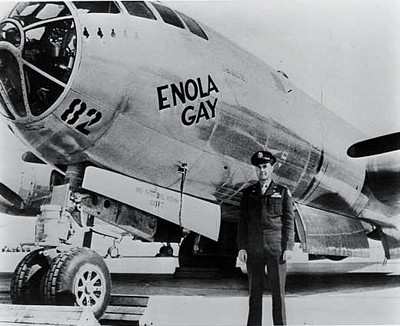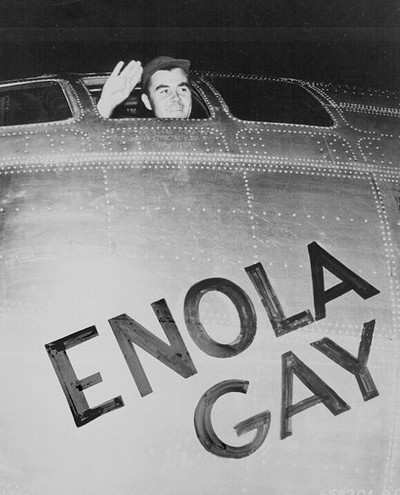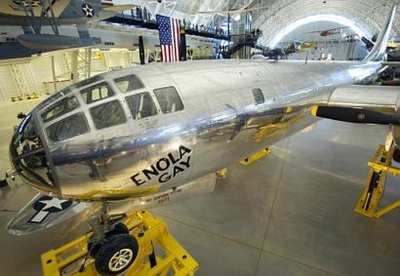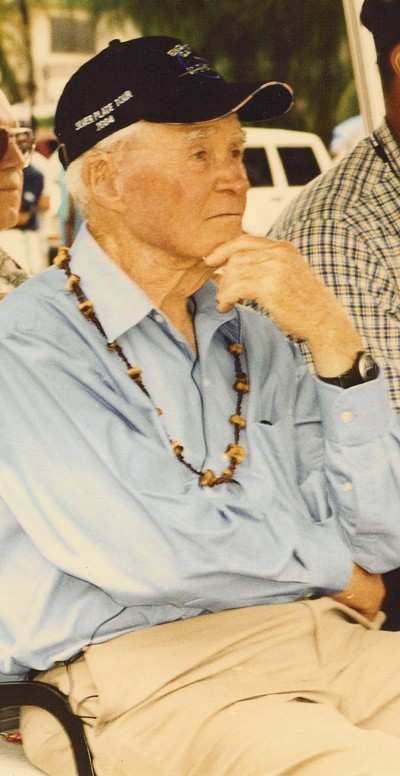Enola Gay B-29 Pilot Was 92
It was one moment in time, that brought about an end to war...
the annihilation of a city, and a large portion of its
population... and both fame and infamy to Paul Warfield Tibbets,
Jr. The dropping of the first atomic bomb on Hiroshima, Japan on
August 6, 1945 changed the world forever -- and left Tibbets, who
flew the B-29 Superfortress "Enola Gay" that dropped that bomb,
with no regrets.

"I knew when I got the assignment it was going to be an
emotional thing," Tibbets recounted to The Columbus Dispatch for a
story on the 60th anniversary of the bombing. "We had feelings, but
we had to put them in the background. We knew it was going to kill
people right and left. But my one driving interest was to do the
best job I could so that we could end the killing as quickly as
possible."
Tibbets passed away Thursday in Columbus, at the age of 92,
according to friend Gerry Newhouse. To the very end, Tibbets had to
ward off protestors who criticized him for his role in the
destruction of a city, and the loss of between 70,000 and 100,000
people.
Per his own request, Tibbets will have no funeral, and no
headstone -- so as not to give those protestors a place to
gather.

In a 1975 interview, Tibbets asserted he felt it was his
patriotic duty to perform his fateful mission... firmly believing
it brought about a swift end to World War II in the Pacific, and
saved possibly tens of thousands of American lives that would have
been lost in a ground invasion on Japan.
"I'm not proud that I killed 80,000 people, but I'm proud that I
was able to start with nothing, plan it and have it work as
perfectly as it did," he said at the time. "You've got to take
stock and assess the situation at that time. We were at war. ...
You use anything at your disposal.
"I sleep clearly every night," he added.
Tibbets stood firmly against those who decried his actions. He
denounced a planned 50th anniversary exhibit of the Enola Gay at
the Smithsonian Institution in 1995, that many veterans thought
paid too much attention to the suffering of those in Hiroshima, and
not nearly enough to Japan's brutality before and throughout the
war... or the need to stave off a US ground assault.

Saying the bombing was an unmitigated blessing, Tibbets called
the proposed exhibit's focus "a damn big insult." In the end, the
museum opted to simply display the Enola Gay's fuselage, without
commentary... and let viewers make their own peace with it.
Twenty years before, Tibbets attracted criticism -- and even
prompted a formal apology from the US government -- for a staged
re-enactment of the bombing at an air show in Harlingen, TX. As he
flew a B-29 over the flight line, a bomb was set off on the
runway... creating a mushroom cloud. Japanese citizens were
outraged, despite Tibbets' assertions the display "was not intended
to insult anybody."
Tibbets -- who withdrew from medical school in 1937 to enlist in
the Army Air Corps -- will likely be cremated, Newhouse said, per
his wishes. In a 2005 interview with the Dispatch, Tibbets said he
wanted his ashes scattered over the English Channel.

Wherever he is ultimately laid to rest, Tibbets will leave
behind a legacy forever known, analyzed, applauded, and criticized.
ANN wishes this fallen aviator well, as he heads west into the
setting sun.
 Classic Aero-TV: In Praise of Alabamas Patriot Aircraft USA
Classic Aero-TV: In Praise of Alabamas Patriot Aircraft USA NTSB Final Report: Cirrus Design Corp SR22
NTSB Final Report: Cirrus Design Corp SR22 ANN's Daily Aero-Term (12.21.25): Dead Reckoning
ANN's Daily Aero-Term (12.21.25): Dead Reckoning ANN's Daily Aero-Linx (12.21.25)
ANN's Daily Aero-Linx (12.21.25) Aero-News: Quote of the Day (12.21.25)
Aero-News: Quote of the Day (12.21.25)






